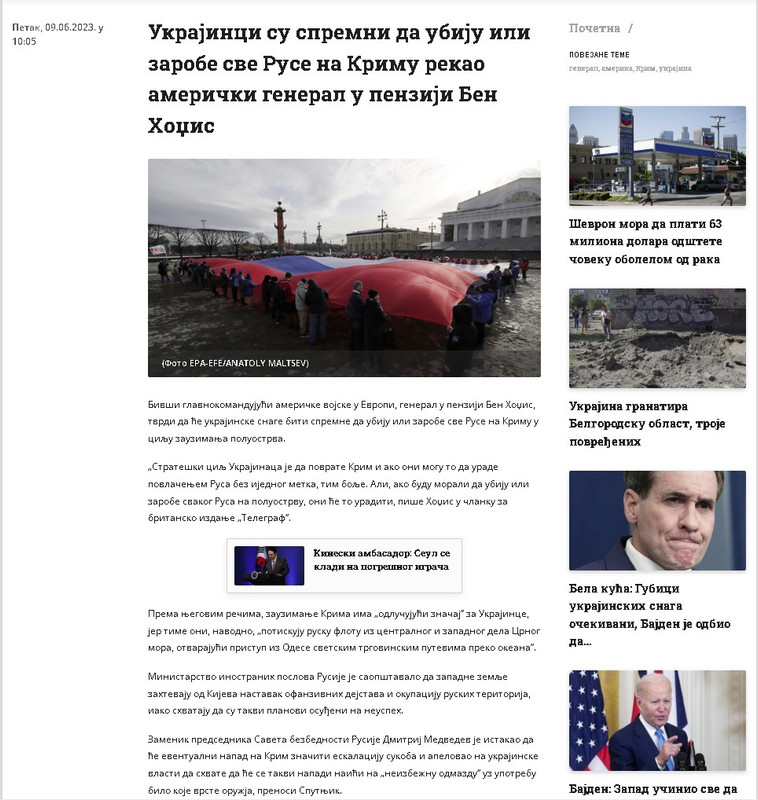That said, at some point those bridges are coming down. The Ukrainians’ strategic objective is to regain Crimea, and if they can do that by a Russian withdrawal without firing a shot, so much the better. But if they have to kill or capture every Russian on the peninsula, they will.
https://www.telegraph.co.uk/news/20...r-offensive-armour-committed-fight-on-hodges/
Ukraine counter-offensive: Once the armour is committed the fight is on
Every word out of Putin’s mouth is a lie
BEN HODGES
FORMER COMMANDER, US ARMY EUROPE
8 June 2023 • 1:41pm
A Ukrainian tank crew training hard so they can fight easy CREDIT: Anadolu
Fighting is intensifying
all along the Ukrainian battle front, from the Russian border province of Belgorod all the way to the Black Sea coast. These are the “shaping” operations, necessary precursors to the imminent Ukrainian counteroffensive, intended to confuse the Russian general staff as to the specific date, time and place of the main attack.
Once the Ukrainian armoured brigades are fully committed, we can say that the fight is truly on. However the Ukrainians have shown themselves to be very disciplined regarding the release of information, and I would not trust any report coming from the Russian side about what’s happening on the line of contact.
I would hope that we, and the Russian staff, will not know what Zelensky and the Ukrainians are doing until they have already done it.
In the meantime we know the Russians have
blown the Khakova Dam. It doesn’t matter that Putin has blamed the Ukrainians and described the dam’s destruction as a “barbaric act”: every word out of his mouth is a lie. The dam was clearly demolished using internal explosives, not struck by a weapon, and it was under Russian control. Furthermore there is no advantage in blowing the dam for the Ukrainians: this is a colossal economic and ecological disaster for their country and they will be dealing with the damage for a long time to come.
Even the Russians will probably not gain as much military benefit as they might hope. Some experts think the floodwaters will subside within the next five to seven days and the ground there will begin to dry rapidly in the summer heat. The effect hoped for by the Russians, that of restricting the Ukrainians’ manoeuvre options, is likely to be short lived. In my judgement the Russians panicked here and blew the dam too early to get the desired effect.
What the dam demolition has accomplished is to remind us, yet again, of who the Russians are. It is a typical “blunt instrument” act: it has visited enormous destruction and suffering on innocent civilians, and as such is a
war crime. It demonstrates, yet again, that the West should not press Zelensky to negotiate with the Kremlin until Ukraine has achieved all its war aims.
Those achievements may soon be appreciably closer. If the current probes permit the Ukrainians to identify a weak spot, we can expect that vulnerability to be struck hard and fast. Last year the Ukrainians demonstrated that they have excellent tactical flexibility: this is because they have adopted a Western style command structure in which lower-level commanders can take the initiative and exploit opportunities. It may not be the Ukrainian general staff who actually trigger the decisive move, but a relatively junior armour officer who recognizes the opportunity and takes it, and the next level commander who chooses to reinforce that success.
The Russians have built hundreds of miles of trenches with bunkers, minefields, anti-tank ditches and “Dragons Teeth” obstacle belts. But these defences are only as good as the soldiers occupying those trenches and covering those obstacles. I haven’t been impressed with the fighting capabilities of the Russians in most places, and the vicious infighting we see between the various Russian leaders highlights the lack of cohesion on the Russian side. The Ukrainians will seek to exploit these divisions.
Once the Ukrainians have punched through the line and are in the Russians’ rear, there will be a powerful psychological effect. The aim is to try to bring about a collapse, which should be very achievable given the poor state of Russian morale. If this happens a major change in the battle front can take place.
My assumption is that the Ukrainians’ operational aim is to isolate Crimea. If they can reach the Azov Sea, anywhere between say Mariupol and Melitopol, they will be able to make the Russian position in Crimea untenable. There will also be a secondary aim of securing the area around the Zaporizhzhya nuclear powerplant.
If the Ukrainians can isolate Crimea, I would guess that to begin with the Kerch bridges will be left standing, though they could probably be struck by UK-supplied Storm Shadow missiles or other weapons in that scenario: and indeed Ukraine has managed to strike those bridges once already. Leaving the bridges up would give the Russian occupiers an avenue of retreat, which they would hopefully make use of.
That said, at some point those bridges are coming down. The Ukrainians’ strategic objective is to regain Crimea, and if they can do that by a Russian withdrawal without firing a shot, so much the better. But if they have to kill or capture every Russian on the peninsula, they will.
Regaining
Crimea is critical for the Ukrainians, as it pushes the Russian navy out of the central and western Black Sea, opening up access from Odesa to the world’s ocean trade routes again. Russia would still menace the Azov and its ports, but it would no longer be in total control. The Russian fleet would have to withdraw from the Sevastopol naval base to the less capable port of Novorossiysk. Indeed, many of its smaller vessels would probably have to be redeployed to the Caspian Sea via inland waterways.
Make no mistake: if there is to be any hope of eventual Ukrainian economic recovery, so that the
nation’s refugees can return home and Eastern Europe can return to normal, Russian control of the Black Sea must end. That means that Putin must give up Crimea. Anything else is a victory for him and a defeat for Ukraine and for the West.
There’s another important thing for Western observers to remember. I am personally deeply impressed by the Ukrainian commanders’ abilities in the field of operational art, and their disciplined approach to warfare. They are committed to achieving their goals but they will not waste the lives of their soldiers to no purpose. We will know the fight is on once the heavy armoured formations are committed: but if they don’t perceive the right opportunity that may not happen soon, despite the impatience being exhibited both inside and outside Ukraine right now.
Lieutenant General (Retired) Ben Hodges served as commanding general, United States Army Europe. Previously he was a brigade commander during the 2003 invasion of Iraq








